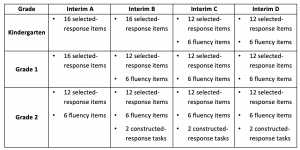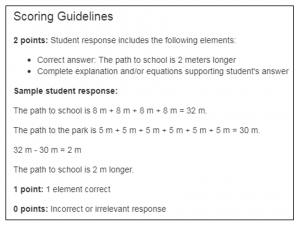Overview
The CenterPoint interim assessments were designed to provide information that helps teachers understand the breadth of students’ skills and understandings in mathematics content and mathematics practices that are typically measured on state summative assessments. Students answer a variety of questions, including selected response, fill in the blank, technology-enhanced items, and, beginning in grade 2, constructed-response items.
These assessments can be used as a standards-based solution to measure student progress over time and to inform curriculum and instruction. The K-2 Mathematics Interim Assessments consist of four unique forms designed to be administered after approximately every 6 weeks of instruction.
The purpose of these assessments is to provide educators with the information needed to personalize instruction and intervention to help students demonstrate conceptual understanding of mathematics and solve problems successfully. The assessments have been designed to maximize instructional time and minimize testing time. After administering an assessment, educators will receive immediate feedback from all machine-scored items and will have the opportunity to hand score the constructed-response items using the associated rubric to help ensure consistent scoring. This information can then be used to inform instructional decisions.
Assessment Design
College- and career-ready standards in Mathematics are designed to describe the knowledge, skills, and understandings essential to post secondary success. This includes an emphasis on major content, supporting content, and additional content in each grade or course as well as the mathematical practices.
These interim assessments are designed to measure students’ conceptual understandings and skills as defined in the standards. The mathematical practices also come into play as grade 2 students solve problems in the constructed-response items that focus on students’ abilities to model and reason with mathematics. The assessments focus on measuring student progress toward mastery of foundational skills that are most important for success in mathematics in later grades. Some standards are repeated across forms to build in progress monitoring and/or to assess different parts of a standard as student understanding builds throughout the school year.
The K-2 interim assessments were designed with the developmental needs of young students at the forefront. Because students may not yet be fluent readers, all items on the kindergarten and grade 1 assessments were recorded so that students may have the questions, when appropriate, read aloud. This design allows students to demonstrate their mathematical abilities without their reading abilities being a factor.
Universal Design
CenterPoint applies principles of universal design to increase the accessibility, and therefore fairness, of each assessment for all students. Universal design is essential to valid measurement practices. If assessment questions are not accessible or fair for every student, then the evidence collected will not provide meaningful information about students’ knowledge and/or abilities.
Interim Assessment Specifications
Each kindergarten and grade 1 form contains 16-18 questions; each grade 2 form contains 18-20 questions. A description of the types of questions on each form is shown in the table.

Scoring Student Responses (Grade 2 Only)
Constructed-response items are designed to be hand scored. Each constructed-response item has an associated rubric that can be accessed via the online platform. The rubric includes the score point descriptors for each score point and answer cues provided for the item. Teachers within schools and districts should work together to ensure student responses are being scored consistently. A sample rubric is shown.
Sample Scoring Rubric

Next